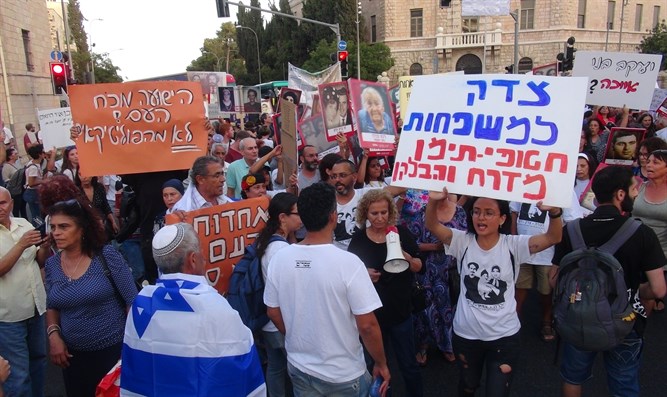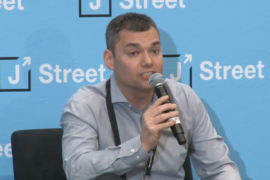Hundreds of protesters gathered outside the prime minister’s residence in Jerusalem Thursday evening, demanding that the government recognize claims that babies from Jewish Yemenite families were taken from their parents during the early years of the state.
The demonstrators demanded that classified government files be released and that all information on the matter be made public.
Thursday marked the awareness day for the “Yemenite Children Affair.”
Since the 1950s, more than 1,000 Jewish families — mostly new arrivals to the country from Yemen, but also dozens from the Balkans, North Africa and other Middle Eastern countries — have alleged that their newborn children were systematically taken from Israeli hospitals by state authorities and put up for adoption, sometimes abroad. The families were told that their children had died.
Families and their supporters have long held that this policy was part of a broader effort by Israel’s early governments to forcibly westernize Israel’s Mizraḥi Jewish population. In the early years of the state, Prime Minister David Ben-Gurion’s ruling Mapai party prioritized aligning Israel with the Western world and largely viewed the influx of ethnic Jews from Arab lands as an obstacle to building a society modeled on Western culture and values.
Long orientalized by gentile neighbors in Europe, many of Israel’s Ashkenazi elites – especially from circles affiliated with Mapai Labor Zionism – came back to the Middle East and in turn orientalized Mizraḥi Jews in an effort transfer the “savage” oriental identity away from themselves.
Labor Zionists have long argued it to be in the State of Israel’s best strategic interest to make itself useful to imperial powers by existing as an outpost of Western civilization in the Middle East.
Challenged by three state commissions that examined theYemenite Children Affair and concluded that most of the children in question had actually died, the issue has continued to resurface, primarily because most of the families in question were not given their children’s bodies or informed of their burial places.
Death certificates were also riddled with suspicious errors and most of the missing children were sent army draft notices 18 years after their alleged deaths.
There have also been cases in which adopted children were able to confirm, through DNA tests, that they were from Yemenite families who had been told that their children had died.
The Knesset passed a law in February that would permit the families of children who disappeared to seek a court-ordered exhumation of the graves where their relatives have been believed to be buried, for purposes of genetic testing.
The law, proposed by member of Knesset Nurit Koren (Likud), applies to families of children who went missing between 1948-1970, permitting them to seek a court-ordered exhumation of remains to enable DNA comparisons.
Under the measure, the relatives will have to give evidence to the family courts substantiating their doubts that their relatives are buried in the various sites, it stipulates.
The demonstrators at Thursday’s protest demanded that the government recognize the Yemenite children’s case as a crime and do everything possible to heal the wounds of the families.
The initiators of the demonstration called for the State of Israel to conduct direct, transparent and sincere talks with the families and with civil society organizations in order to repair and heal the national wound.
One demonstrator told journalists that “our demand is clear and it is first of all to recognize this affair as a crime and of course the open cases and graves. There is still no official who had said that a crime has occurred here and the state takes responsibility. It is not too late to correct this and ask forgiveness from the families.”





